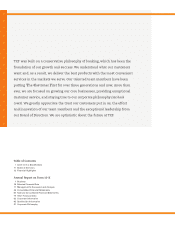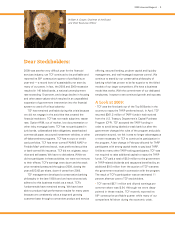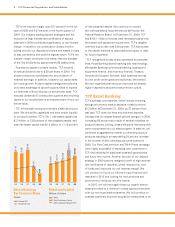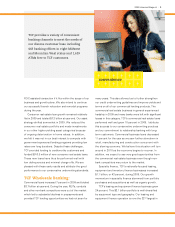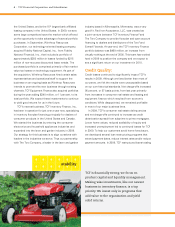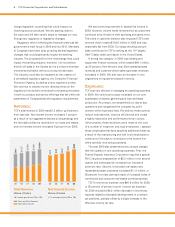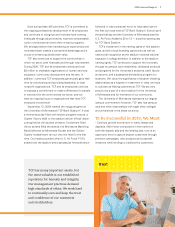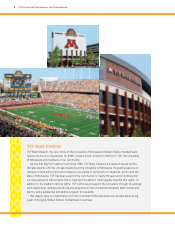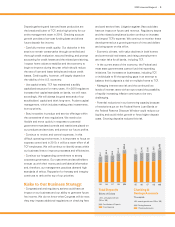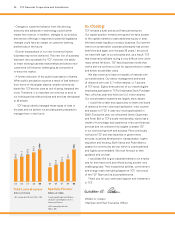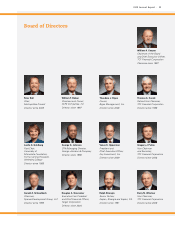TCF Bank 2009 Annual Report Download - page 3
Download and view the complete annual report
Please find page 3 of the 2009 TCF Bank annual report below. You can navigate through the pages in the report by either clicking on the pages listed below, or by using the keyword search tool below to find specific information within the annual report.
2009 Annual Report : 1
offering, secured lending, prudent capital and liquidity
management, and well-managed expense control. We
continue to stand by our conservative philosophy of
banking which has proven to be far superior to the failed
models of our larger competitors. We have a business
model that works. With the commitment of our dedicated
employees, I expect to see continued growth and success.
A Look at 2009:
• TCF was the first bank out of the Top 50 Banks in the
country to repay the TARP preferred stock. In April, TCF
returned $361.2 million of TARP funds it had received
from the U.S. Treasury Department’s Capital Purchase
Program (CPP). TCF accepted the TARP funding in
order to avoid being labeled a weak bank but after the
government changed the rules of the program and public
perception soured, we felt it was no longer advantageous
or even necessary for TCF to continue its participation in
the program. A law change in February allowed for TARP
participants with strong capital levels to pay back TARP.
Unlike so many other TARP-exiting participants, TCF was
not required to raise additional capital to repay the TARP
funds. TCF paid a total of $8.9 million to the government
in TARP-related dividends and taxpayers benefited by an
additional $9.5 million from the auction of TCF warrants
the government received in connection with the program.
The result of TCF’s participation was an estimated 11
percent after-tax cost to TCF stockholders.
• TCF earned $87.1 million and diluted earnings per
common share was $.54. Although we were disap-
pointed in these results, TCF recently reported its
59th consecutive profitable quarter while many of our
competitors fell short during the economic crisis.
2009 was another very difficult year for the financial
services industry, yet TCF continued to be profitable and
reported its 59th consecutive quarter of profitability at
year-end — a record level of sustainability not seen by
many of our peers. In fact, the 2008 and 2009 recession
resulted in 140 failed banks, a national unemployment
rate exceeding 10 percent, and a large decline in housing
and other asset values which resulted in an unparalleled
expansion of government intervention into the financial
system to ward off a fiscal calamity.
TCF has remained profitable during this crisis because
we did not engage in the activities that created the
financial meltdown. TCF has not made subprime, teaser
rate, Option ARM, out of market, low documentation or
other risky mortgage loans. TCF has not participated in
junk bonds, collateralized debt obligations, asset-backed
commercial paper, structured investment vehicles, or other
off-balance-sheet programs. TCF has no auto or credit
card portfolios. TCF has never owned FANNIE MAE®
or
Freddie Mac®
preferred stock, trust preferred securities
or bank-owned life insurance. TCF did not originate, secu-
ritize and sell assets. We have no derivatives. While we
did not participate in these activities, we were not immune
to their effects. TCF’s earnings were down and the stock
price remained pressured throughout 2009, closing the
year at $13.62 per share, down 4 cents from 2008.
TCF management developed a conservative banking
philosophy in the late 1980’s and we have since strictly
adhered to this business model; as a result, TCF’s
fundamentals have remained strong. We have been
able to produce high performance results for many years
because we consistently value a large and growing
customer base through a convenient product and service
Dear Stockholders:
William A. Cooper, Chairman of the Board
and Chief Executive Officer


